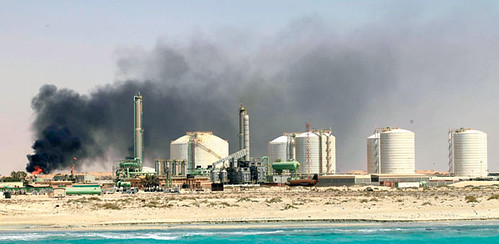
Zueitina oil terminal located near Benghazi, Libya has been the scene of labor unrest. The industry in Libya is no facing a downturn in production after the imperialist overthrow of Gaddafi., a photo by Pan-African News Wire File Photos on Flickr.
Libya Militia Says Oil Terminals to Remain Closed
TRIPOLI, Libya December 15, 2013
By ESAM MOHAMED Associated Press
The head of a Libyan militia that has shut down most of the country's oil terminals for months said Sunday they will remain closed because the government has failed to meet his group's demands— mainly a share of revenues for their eastern region.
Ibrahim Jedran, leader of the militia in eastern Libya, had promised to reopen the oil terminals Sunday following mediation from influential tribal leaders. Jedran accused the government of corruption and of "watering down" his group's demands.
Jedran, head of the so-called Political Bureau of Barqa, is a leading advocate of a federal state in which each region has some autonomy as was the case from 1951 until 1963 under King Idris when Libya was divided into three regions: Cyrenaica, or Barqa, Tripolitania and Fezzan. Like other Libyan regions, easterners have long complained of discrimination by the central government in Tripoli.
He had declared the formation of an autonomous regional government and the formation of a regional company to handle sales of oil in the last two months, increasing the challenge to a central government already weakened by the proliferation of militias. The central government rejected the declarations but has not moved against the militia that shut the terminals since last summer.
"The closure of the oil terminals in eastern Libya will continue. Work will not resume there because of the failure to reach an agreement with the interim government to implement the conditions of the region," he said in the eastern town of Ajdabiya, 480 miles (800 kilometers) southeast of Tripoli. "We will not reopen the terminals because of the corruption of the interim government which doesn't care about the real demands of Libyans."
Jedran had demanded the government investigate corruption in oil sales since the CIA-Pentagon-NATO war of regime-change resulting in the overthrow of longtime leader Moammar Gadhafi, as well as ways to distribute revenue based on a federal system adopted in the early days of King Idris.
Jedran has wide support among local tribes, particularly their youth. He had been in charge of securing oil terminals in the area, and continued to receive salaries from the state budget for the job until this summer.
He had indicated that his group has "other options" if the government refuses the conditions. He didn't elaborate.
Earlier this month, Prime Minister Ali Zidan said that the government is spending billions of dollars of its foreign reserves to compensate the losses of oil revenues. Libya has been losing millions of dollars every day after production dropped from 1.4 billion barrels a day to a few thousand since the closure.
On Friday, Zidan said the government can force open the terminals but would rather avoid the bloodshed.
Influential tribal leader Saleh al-Atyoush, who is from the same tribe as Jedran, had mediated with the government the reopening of the terminals on Sunday. He said the government had agreed to investigate the corruption allegations and to form a committee with regional representatives to review oil distribution and revenues. But al-Atyoush said the government will not accept changing the distribution system in a way that would legitimize a federal system.
"The government agreed to two of the demands," he said in remarks aired by Al-Nabaa Libyan TV station. Al-Atyoush disowned Jedran, saying his tribe has nothing to do with the ongoing crisis. "Our tribe supports the state."
No comments:
Post a Comment